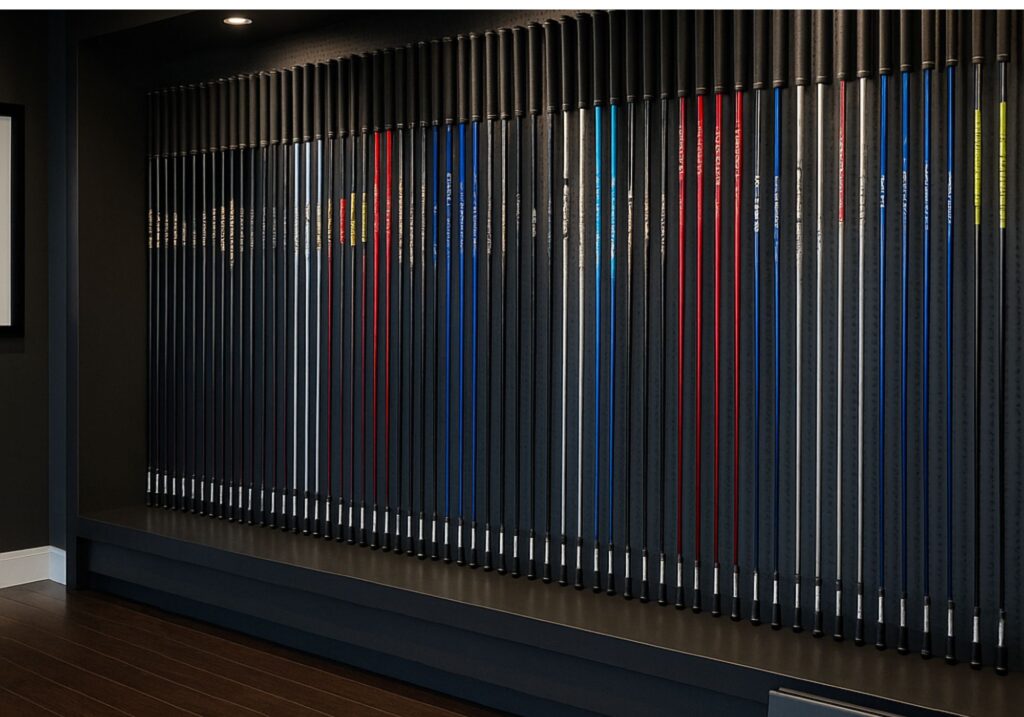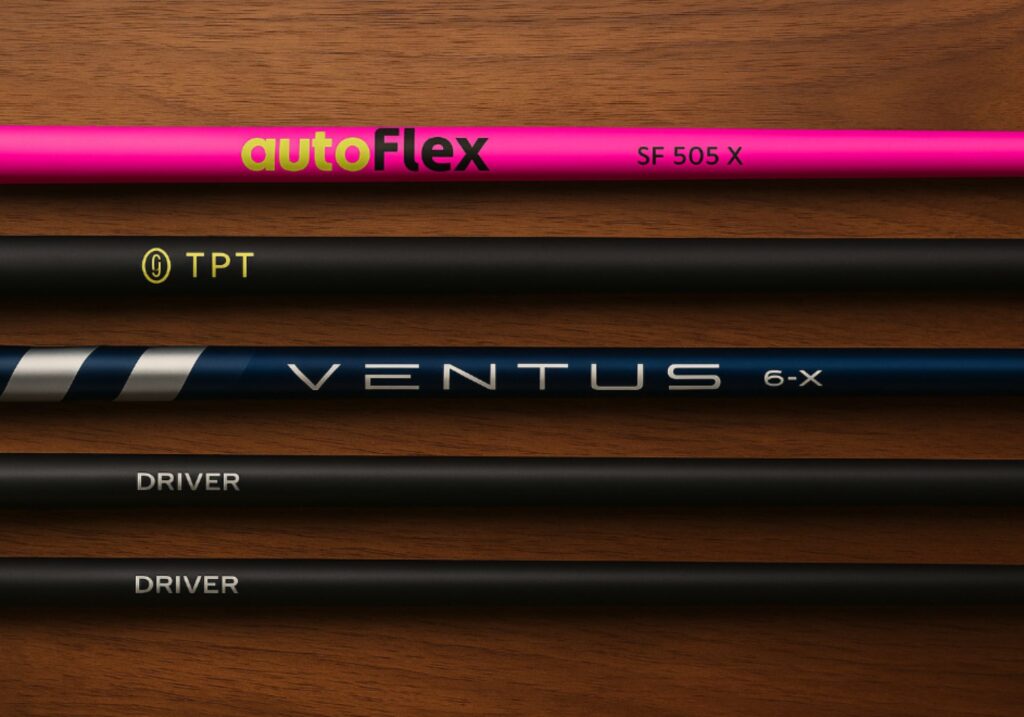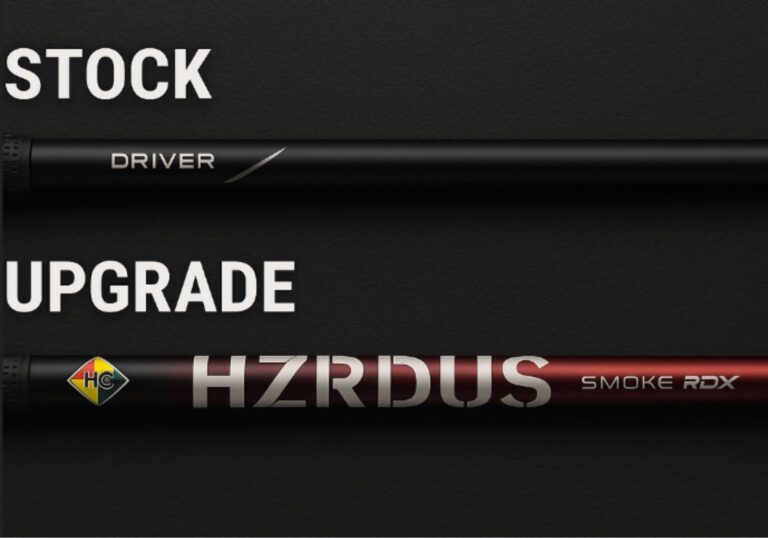Wondering what driver shaft is right for you?
You’re not alone. It’s one of the most common questions golfers ask during a fitting or while browsing the rack at a golf shop:
- Are stock shafts good enough?
- Is it worth paying more for a specialty shaft?
- Can the shaft alone really change how a driver performs?
If you’ve asked any of these, this article is here to help.
What is a stock shaft?
Let’s start with the basics. A stock shaft is the standard shaft offered by a club manufacturer when you buy a driver. These shafts are typically produced in large quantities and are often made in partnership with major shaft companies like Mitsubishi, Fujikura, Project X and others.
That doesn’t mean they’re cheap or bad. Quite the opposite. Most stock shafts are selected because they pair well with that specific head design and work for a large percentage of golfers. They’ve been tested, refined and chosen for a reason.

Why stock shafts make sense
There’s a reason you see stock options in most driver fittings, retail stores, and demo days. For many golfers, they simply work. Here are a few reasons to stick with the stock setup:
- Built for the clubhead. OEMs design drivers and then match them with shafts that complement the launch, spin and stability characteristics of the head. These are engineered to work together.
- No upcharge. You’re not paying extra, which keeps your total spend lower while still getting solid performance.
- Easy to find and demo. Stock shafts are widely available during fittings, demo days and in retail environments, so you can try before you buy.
- More inventory and flexibility. Need a replacement? It’s far easier to get another stock shaft through your local shop or directly from the OEM.
For the majority of golfers, especially mid- to high-handicappers, a properly fit stock shaft can deliver excellent results.
Stock shaft drawbacks
That said, stock shafts do come with limitations, especially for players with very specific swing traits.
- May not be fully optimized. While stock options are designed to work for most golfers, they may not deliver the exact launch and spin window your swing needs. If you’re chasing peak numbers, a custom fit shaft might offer an edge.
- Less customization in weight or profile. Some stock shafts only come in one or two weight classes or flexes, which could limit fit options.
- Not always a perfect match for outliers. Golfers with extremely high swing speeds, unique tempos, or unusual delivery patterns might not find a great match in a standard stock offering.
What about specialty shafts?
Specialty, or “upcharge,” shafts are usually high-end aftermarket options from premium shaft manufacturers. These are designed with specific performance characteristics in mind. Whether it’s tighter dispersion, higher launch, lower spin, or a particular feel profile.
When paired correctly, these shafts can unlock performance benefits that go beyond what a stock shaft offers.
Specialty shaft benefits
For golfers looking to dial in every detail of their driver setup, specialty shafts can be game changers.
- Tailored to your swing. During a proper fitting, a specialty shaft can help fine-tune launch and spin to match your swing speed, angle of attack, and tempo.
- Confidence. Knowing you’ve gone through the process and selected the best shaft for you can add confidence on the tee. And confidence matters.
- Wider range of profiles. Specialty shafts come in a variety of flexes, weights and torque levels that can be matched exactly to your needs.
- Materials and technology. These shafts often use higher-grade carbon fiber, advanced resin systems, or variable stiffness zones to enhance feel and control.
Specialty shaft drawbacks
As good as they can be, specialty shafts are not without a few downsides:
- Cost. Most upcharge shafts add anywhere from $100 to over $500 to the price of a driver. Some premium models can go well beyond that.
- Harder to test. Because these shafts are not always stocked by default, you may need to visit a specialty fitter or book an appointment with a fitting center that carries the full lineup.
- Potential for overfitting. Some golfers go chasing numbers or feel and end up with something that doesn’t actually benefit their game. Just because a shaft is expensive doesn’t mean it’s better for you.

Which one is right for you?
Here’s the truth: there’s no universal answer. What works best depends entirely on your swing, your goals, and your budget.
For many golfers, a properly fit stock shaft can provide all the performance they need. For others chasing every last yard, looking for tighter dispersion, or wanting a particular feel, investing in a specialty shaft might be worth it.
If you’re not sure, the best place to start is a driver fitting. Try both. See the numbers. Feel the difference. And remember, performance is personal.
Final thoughts
You don’t need to spend hundreds of dollars on a driver shaft to hit great tee shots. Stock shafts today are better than ever and they’re paired intentionally with the heads they’re designed to match.
But if you want that extra edge or have very specific fitting needs, specialty shafts open the door to another level of precision and performance.
The key is getting fit and finding something that works for your swing. Not just what’s trending or has a big price tag.
Your turn
Have you stuck with a stock shaft or gone down the specialty shaft route? What’s worked best for you? Let us know what you’re playing and how it’s changed your driving performance.
